
Whether you’re going on your first date or deciding to move in together, there are plenty of ways to really get to know someone. Spend time talking (and listening) to each other, share some of your most embarrassing moments, or even play icebreaker games like twenty questions. Whatever you do, though, there’s one thing most relationship gurus agree is a pretty bad idea: snooping. It may be tempting to look at your partner’s cellphone when they aren’t looking or peek inside his or her medicine cabinet, but experts warn it could negatively affect relationship trust in the future.  Still, that doesn’t stop some people from doing it anyway. To take a closer look at the way men and women spy on their partners, we surveyed over 1,000 people about the poking, prodding, and prying they’ve done in current and past relationships. Want to know how many people creep on their partners, what they’re looking through, and why? Keep reading to find out.
Still, that doesn’t stop some people from doing it anyway. To take a closer look at the way men and women spy on their partners, we surveyed over 1,000 people about the poking, prodding, and prying they’ve done in current and past relationships. Want to know how many people creep on their partners, what they’re looking through, and why? Keep reading to find out.
Prying personalities
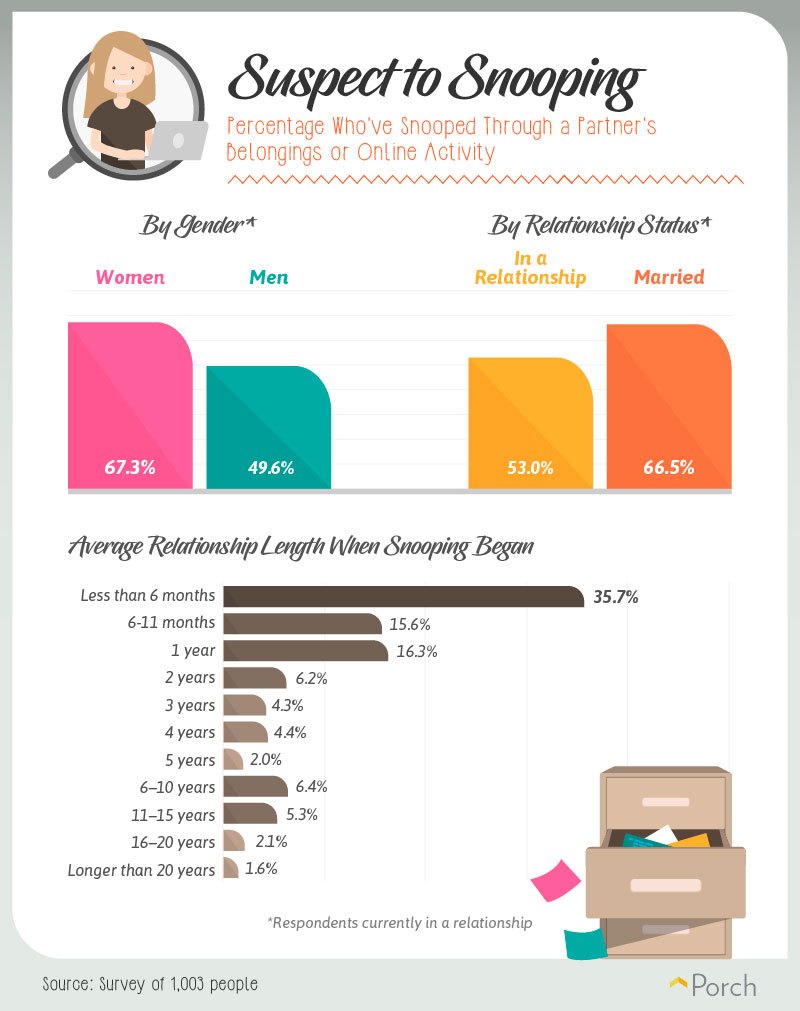 At its core, the idea of snooping on a partner is usually about trust. Relationship experts suggest that a lack of confidence might not just be exclusive to your partner but also apply to yourself. Lacking confidence or feeling not good enough can lead people to paint their partners as the villains.
At its core, the idea of snooping on a partner is usually about trust. Relationship experts suggest that a lack of confidence might not just be exclusive to your partner but also apply to yourself. Lacking confidence or feeling not good enough can lead people to paint their partners as the villains.  More than 67 percent of women currently in a relationship admitted to snooping on their partner,compared to less than half of men. As well, for nearly 36 percent of people, meddling in their partner’s privacy started relatively early in the relationship—less than six months after they started dating.
More than 67 percent of women currently in a relationship admitted to snooping on their partner,compared to less than half of men. As well, for nearly 36 percent of people, meddling in their partner’s privacy started relatively early in the relationship—less than six months after they started dating.  Even though checking on what a significant other is up to without his or her knowledge is more likely to occur at the beginning of the relationship, it may become a behavior that’s hard to break. In fact, over 66 percent of married people still snooped on their spouses.
Even though checking on what a significant other is up to without his or her knowledge is more likely to occur at the beginning of the relationship, it may become a behavior that’s hard to break. In fact, over 66 percent of married people still snooped on their spouses.
Digital digging
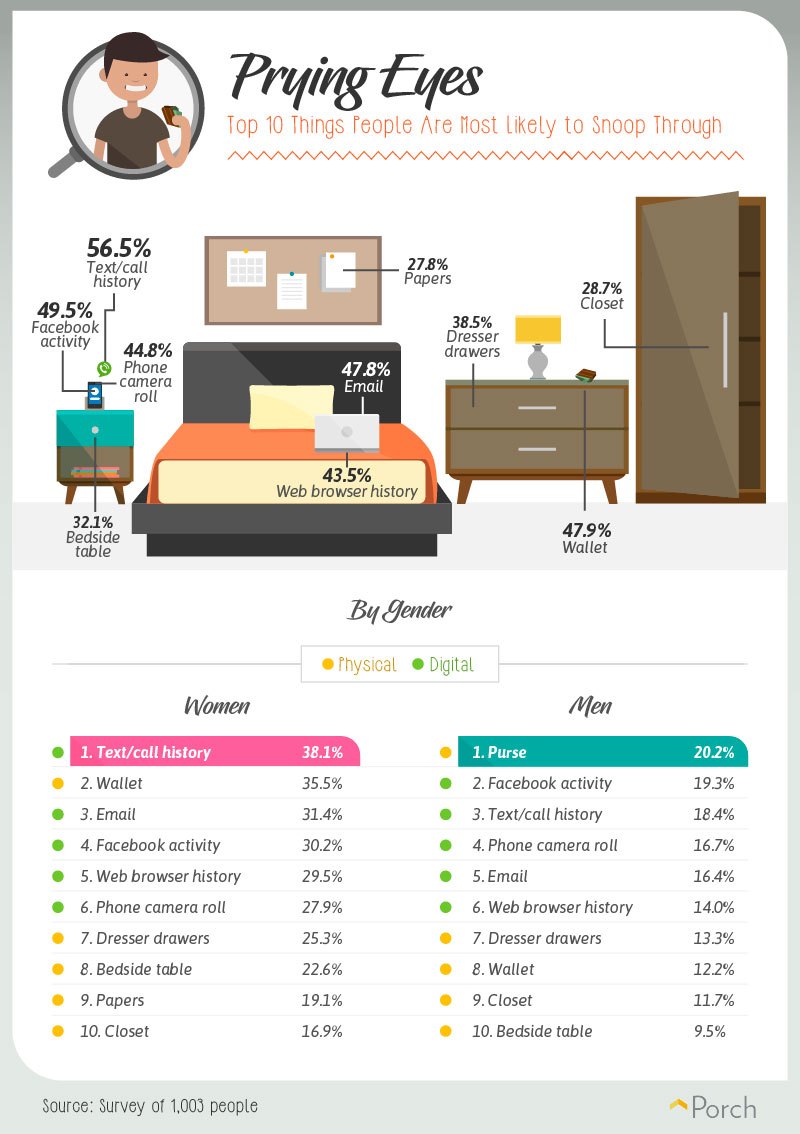 At a time where over 80 percent of people are plugged into social media, platforms like Instagram, Facebook, and Twitter have invaded the bedroom and changed the way people think about their privacy. In 2014, nearly half of millennials even went so far as to say their social media accounts had a “major impact” on their relationships. When it comes to snooping, technology has a tendency to get between people. Nearly 57 percent of people said they’d gone through their partner’s text or call history, followed by 50 percent who snooped through their Facebook activity. Still, peeking through their partner’s purse was more pressing for men than checking on their Facebook activity or camera roll.
At a time where over 80 percent of people are plugged into social media, platforms like Instagram, Facebook, and Twitter have invaded the bedroom and changed the way people think about their privacy. In 2014, nearly half of millennials even went so far as to say their social media accounts had a “major impact” on their relationships. When it comes to snooping, technology has a tendency to get between people. Nearly 57 percent of people said they’d gone through their partner’s text or call history, followed by 50 percent who snooped through their Facebook activity. Still, peeking through their partner’s purse was more pressing for men than checking on their Facebook activity or camera roll.  While women also honed in on their significant other’s call history and wallet, roughly 30 percent peeked at their partner’s email, Facebook history, or web browser history.
While women also honed in on their significant other’s call history and wallet, roughly 30 percent peeked at their partner’s email, Facebook history, or web browser history.
Rationalizing snooping
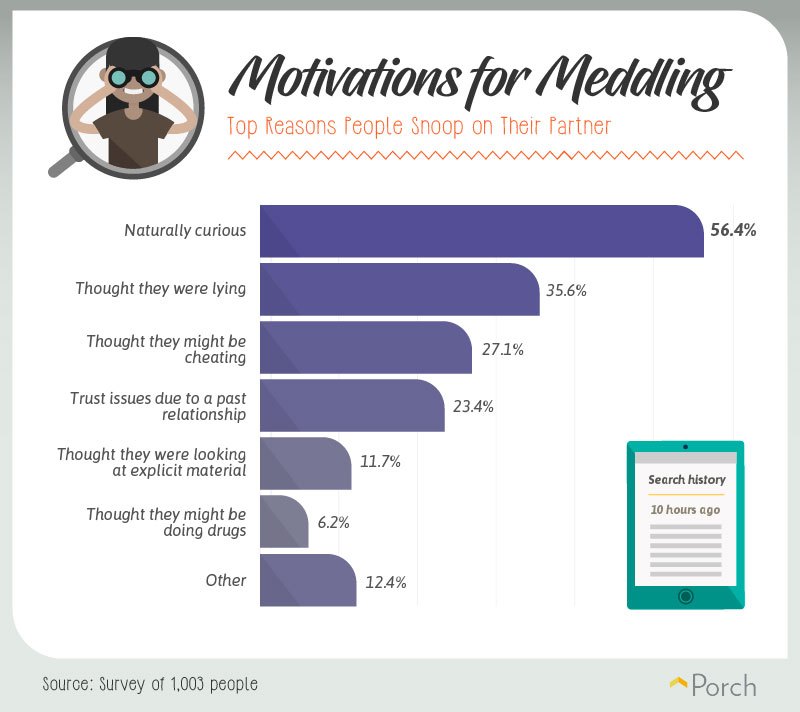 If snooping on a partner can be detrimental to a relationship, why do so many people do it? For a majority of respondents, the biggest concern wasn’t trust or infidelity—it was simple curiosity. More than 56 percent of people said they snooped on their partner not because they were looking for anything in particular, but because they were naturally curious.
If snooping on a partner can be detrimental to a relationship, why do so many people do it? For a majority of respondents, the biggest concern wasn’t trust or infidelity—it was simple curiosity. More than 56 percent of people said they snooped on their partner not because they were looking for anything in particular, but because they were naturally curious.  Additionally, for roughly one-third of participants, the motivation to meddle was a bit more compelling. Nearly 36 percent of people were afraid their partner was lying, and about 27 percent thought they might be cheating. While the temptation to snoop through a partner’s digital and physical life can be tempting, it can be a telltale sign that something else has gone wrong in your relationship.
Additionally, for roughly one-third of participants, the motivation to meddle was a bit more compelling. Nearly 36 percent of people were afraid their partner was lying, and about 27 percent thought they might be cheating. While the temptation to snoop through a partner’s digital and physical life can be tempting, it can be a telltale sign that something else has gone wrong in your relationship.
Sharing is caring
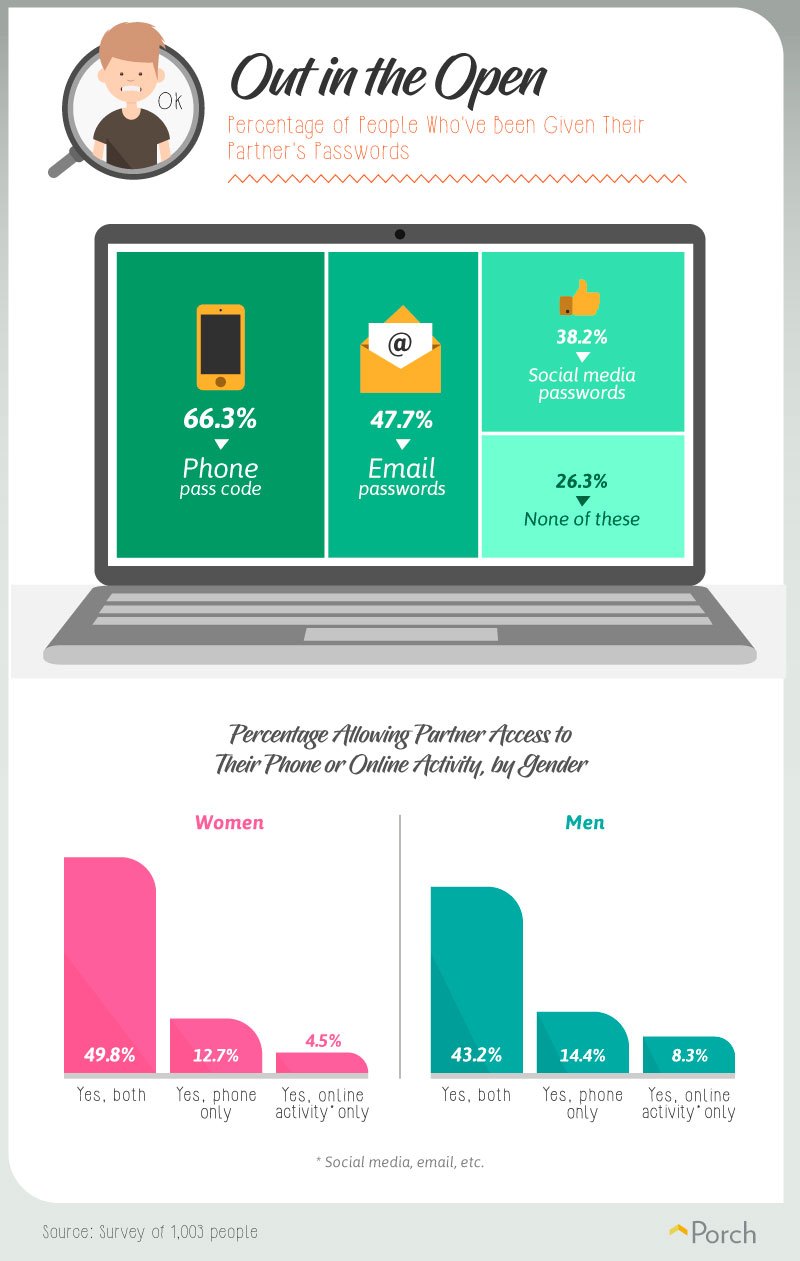 Building trust is one of the most important components of a successful relationship. For some people, that can mean opening up about a sensitive moment from their past, a fear they typically aren’t comfortable sharing, or even what they’ve lied about previously. Instead of leaving their partners to worry about what they might find behind a locked screen, over 66 percent of respondents shared their phone passcode with their significant other. While slightly less common, nearly 48 percent shared their email passwords, and roughly 38 percent were comfortable giving out their social media passwords.
Building trust is one of the most important components of a successful relationship. For some people, that can mean opening up about a sensitive moment from their past, a fear they typically aren’t comfortable sharing, or even what they’ve lied about previously. Instead of leaving their partners to worry about what they might find behind a locked screen, over 66 percent of respondents shared their phone passcode with their significant other. While slightly less common, nearly 48 percent shared their email passwords, and roughly 38 percent were comfortable giving out their social media passwords.  However, over 26 percent of people didn’t give out any of these passwords to their partners. While not everyone is OK giving up their login credentials, more than 43 percent of men and nearly 50 percent of women let their current partner go through both their phone and online activity.
However, over 26 percent of people didn’t give out any of these passwords to their partners. While not everyone is OK giving up their login credentials, more than 43 percent of men and nearly 50 percent of women let their current partner go through both their phone and online activity.
Guilt or no guilt?
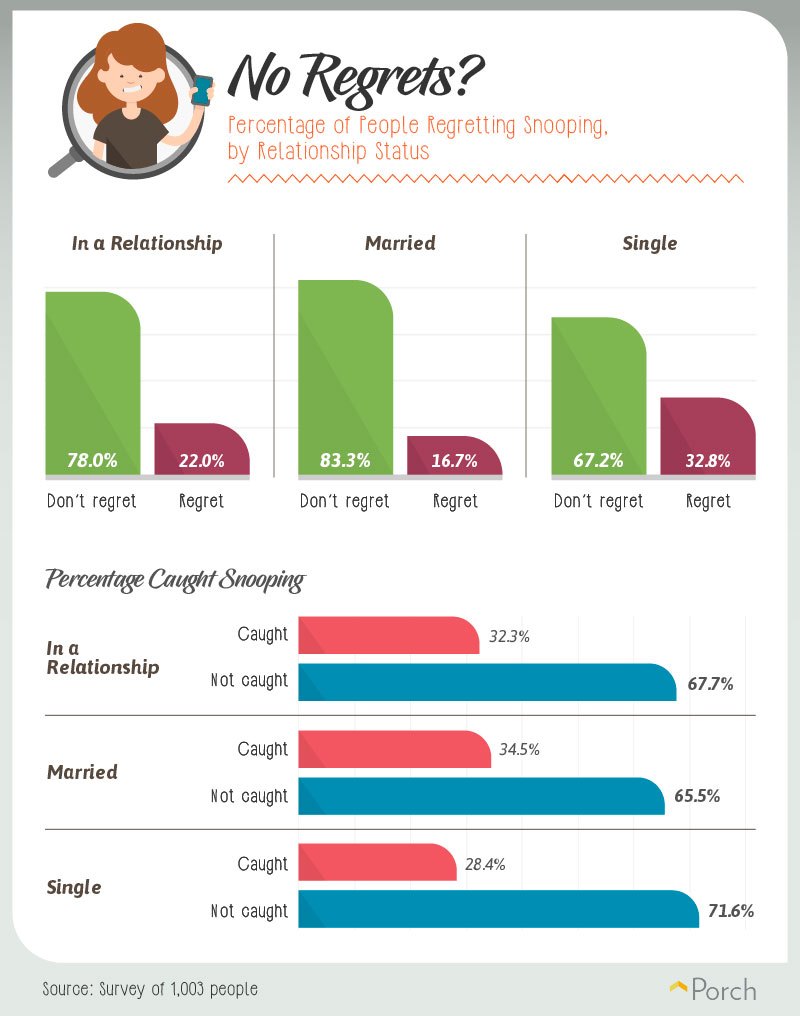 Despite your intentions, going through a person’s wallet, purse, email, or even Facebook activity can be a tremendous invasion of privacy. And even if you’re suspicious of what they’re up to, communication is always a better option than going behind their back to uncover the truth. Unfortunately, a majority of people who snooped on their partners didn’t regret their behavior. Compared to roughly 22 percent of people in a relationship who regretted prying into their significant other’s personal life, 78 percent said they weren’t sorry about deciding to snoop.
Despite your intentions, going through a person’s wallet, purse, email, or even Facebook activity can be a tremendous invasion of privacy. And even if you’re suspicious of what they’re up to, communication is always a better option than going behind their back to uncover the truth. Unfortunately, a majority of people who snooped on their partners didn’t regret their behavior. Compared to roughly 22 percent of people in a relationship who regretted prying into their significant other’s personal life, 78 percent said they weren’t sorry about deciding to snoop. 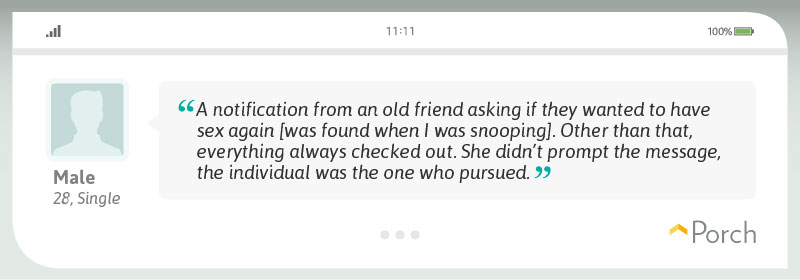 This lack of remorse may be attributed to the likelihood of getting caught. Less than 1 in 3 men and women in a relationship said they were found out for prying into their partner’s affairs, while nearly 68 percent got off scot-free. With no potential repercussions, it could be difficult for some people to feel poorly about playing detective in their significant other’s life.
This lack of remorse may be attributed to the likelihood of getting caught. Less than 1 in 3 men and women in a relationship said they were found out for prying into their partner’s affairs, while nearly 68 percent got off scot-free. With no potential repercussions, it could be difficult for some people to feel poorly about playing detective in their significant other’s life. 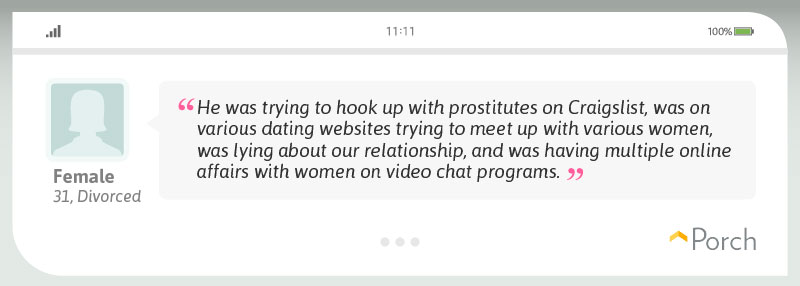
Final verdict
Snooping on the people we date (or even marry) may be more commonplace than you think. Even if you’ve been together for several years, snooping could still be a regular occurrence. While most people didn’t expect to find much by rifling through their partner’s wallet or scrolling through their Facebook feed, most couples still chose to snoop through their partner’s personal belongings and social media accounts just in case. Despite the potential invasion of privacy, most people only regretted their behavior when they got caught. Uncomfortable conversations about digging through each other’s social media activity is bad enough, you shouldn’t have to argue about the to-do list around the house too. Thankfully, Porch is here to help see the tension. Whether you need help installing new appliances, mowing the lawn, or mounting a new TV, the Porch Home Assistant is available 24/7 to connect you with our network of certified professionals in your area. Don’t let those pesky home improvement projects wait another day. Visit us online at Porch.com today to learn more. Even if you suspect something might be wrong in your relationship, snooping through another person’s belongings is disrespectful and could paint you as the bad guy, regardless of what you find. Remember, no matter what your detective work reveals, two wrongs don’t make a right. Methodology We collected 1,003 responses from Amazon’s Mechanical Turk regarding whether a person had ever gone through their partner’s physical belongings or digital presence without them knowing, specifically what they looked through, if they were caught, and what they found. Of these respondents, 468 identified as men, 532 identified as women, and 3 identified as neither. All responses were self-reported. Those who are counted as having snooped went through a partner’s physical belongings or online activity without their partner’s knowledge. Sources
- https://www.cosmopolitan.com/sex-love/a58707/close-encounters-the-case-against-snooping/
- https://www.bustle.com/articles/154363-15-relationship-experts-explain-why-snooping-is-a-terrible-idea
- https://www.nytimes.com/2017/08/29/smarter-living/navigating-social-media-relationships.html
- https://www.refinery29.com/spying-on-someones-phone-relationship-advice
- https://www.yourtango.com/experts/drs-evelyn-and-paul-moschetta/5-kinds-trust-your-marriage-needs
- https://www.bustle.com/articles/154363-15-relationship-experts-explain-why-snooping-is-a-terrible-idea
- https://www.statista.com/statistics/273476/percentage-of-us-population-with-a-social-network-profile/
Fair Use Statement We won’t call it snooping if you decide to share the findings here with your readers for any noncommercial use. Play fair by including a link back to this page so that your audience can see the full details of our project and our contributors earn credit for their work.
